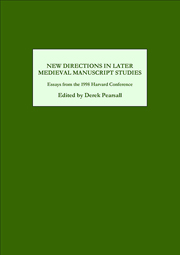Book contents
- Frontmatter
- Contents
- List of Illustrations
- Acknowledgements
- Introduction
- Recent Directions in Medieval Manuscript Study
- Another Fine Manuscript Mess: Authors, Editors and Readers of Piers Plowman
- A New Approach to the Witnesses and Text of the Canterbury Tales
- Prospecting in the Archives: Middle English Verse in Record Repositories
- Medieval Manuscripts and Electronic Media: Observations on Future Possibilities
- Representing the Middle English Manuscript
- Skins, Sheets and Quires
- Reconsidering the Auchinleck Manuscript
- Professional Readers of Langland at Home and Abroad: New Directions in the Political and Bureaucratic Codicology of Piers Plowman
- Professional Scribes? Identifying English Scribes Who Had a Hand in More Than One Manuscript
- Manuscript Production in Medieval Theatre: The German Carnival Plays
- The ‘Lancelot-Graal’ Project
- After Chaucer: Resituating Middle English Poetry in the Late Medieval and Early Modern Period
- Notes on Contributors
- Index
Prospecting in the Archives: Middle English Verse in Record Repositories
Published online by Cambridge University Press: 05 September 2014
- Frontmatter
- Contents
- List of Illustrations
- Acknowledgements
- Introduction
- Recent Directions in Medieval Manuscript Study
- Another Fine Manuscript Mess: Authors, Editors and Readers of Piers Plowman
- A New Approach to the Witnesses and Text of the Canterbury Tales
- Prospecting in the Archives: Middle English Verse in Record Repositories
- Medieval Manuscripts and Electronic Media: Observations on Future Possibilities
- Representing the Middle English Manuscript
- Skins, Sheets and Quires
- Reconsidering the Auchinleck Manuscript
- Professional Readers of Langland at Home and Abroad: New Directions in the Political and Bureaucratic Codicology of Piers Plowman
- Professional Scribes? Identifying English Scribes Who Had a Hand in More Than One Manuscript
- Manuscript Production in Medieval Theatre: The German Carnival Plays
- The ‘Lancelot-Graal’ Project
- After Chaucer: Resituating Middle English Poetry in the Late Medieval and Early Modern Period
- Notes on Contributors
- Index
Summary
Most of those who work with Middle English manuscripts will have some knowledge of the events which took place in Winchester School in June 1934. The Friends of the National Libraries were to visit the Fellows Library, and W. F. Oakeshott, who was at that time School Librarian and an assistant master, had prepared an exhibition for them and included in it MS 13, which he realized might hold some interest:
The safe where the manuscripts were kept was not in the gallery, but in the warden's bedroom … When I at last approached the safe with the key in my hands, it was with some excitement. I slid aside the metal grille … one did not get a chance every day to handle medieval books, so I pulled them out one by one and ran through one after another, catching a glimpse of an illumination here, or an interesting-looking text there, but making no systematic observations or notes. Two or three which were not in Latin but were in English caught my eye. One was very fat, some 480 leaves, paper not vellum, the text prose not verse, clearly about King Arthur and his knights, but lacking a beginning or an end … I made a vague mental note of this prose Arthurian manuscript, and passed on to the next item …
MS 13, a volume of nearly 500 folios, turned out to be none other than what is now London, British Library Additional MS 59678, and the basis of the standard edition of Malory's Morte Darthur. With London, BL MS Addit. 61823, The Book of Margery Kempe, it has been one of the most stunning recent finds among manuscripts of Middle English prose texts. In the field of Middle English verse, new discoveries such as that of the coincidentally-named ‘Winchester anthology’, now London, BL MS Addit. 60577, which recently emerged from private ownership into the saleroom, keep alive the possibility that there remain hitherto unknown texts to be brought to light: in this case a new Petrarch translation, and a number of new witnesses of late Middle English lyrics.
- Type
- Chapter
- Information
- New Directions in Later Medieval Manuscript StudiesEssays from the 1998 Harvard Conference, pp. 41 - 52Publisher: Boydell & BrewerPrint publication year: 2000



